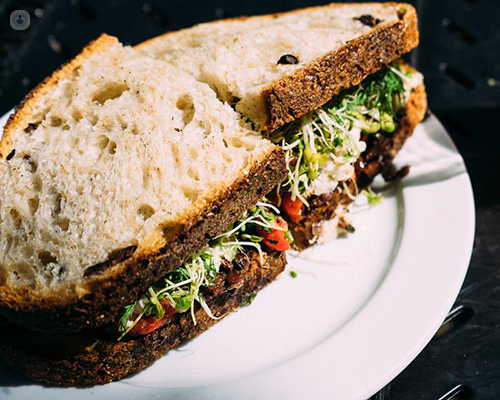Who really needs to eat gluten-free?
Written by:It’s been a part of our diets for years, so why is gluten suddenly such a problem?
The gluten-free craze is showing no signs of abating, but for some people avoiding gluten isn’t just a wellness or weight loss fad. In some cases, it’s a medical necessity because of conditions such as gluten intolerance and coeliac disease. And with scientists now working towards developing a vaccine to treat coeliac disease, following a strict gluten-free diet may become a thing of the past. Here, leading London-based consultant gastroenterologist Dr Aathavan Loganayagam explains just who should be going gluten-free and whether everyone should avoid foods containing gluten altogether.

What is gluten?
Latin for ‘glue’, gluten is a family of proteins found in grains like wheat, barley, rye, oats and spelt. When flour and water are mixed together, the gluten proteins become ‘sticky’, creating a glue-like consistency. Gluten gives elasticity to dough, helping it rise and keeping its shape, giving the final baked product a chewy, satisfying texture.
The abundance of wheat and wheat products in our diets – especially processed and refined varieties – has seen an increase in the number of people suffering from gluten intolerance and coeliac disease.
Gluten intolerance vs. coeliac disease: what’s the difference?
Coeliac disease is a serious autoimmune condition triggered by consuming gluten. It affects people of all ages, both male and female. The smallest exposure to gluten can cause symptoms such as diarrhoea, nausea and vomiting, bloating and abdominal pain, along with feelings of lethargy and general aches and pains.
Coeliac disease can also compromise nutrient absorption, as the body’s abnormal autoimmune reaction to gluten damages the lining of the small intestines. This can lead to deficiencies like anaemia and osteoporosis.
Gluten ‘intolerance’ on the other hand is exactly that – the body’s inability to handle gluten. The major difference between the two is that coeliac disease is diagnosable while gluten intolerance is harder to pin down because, as yet, there are no diagnostic tests available.
It’s estimated around eighty per cent of people with coeliac disease in the UK remain undiagnosed so don’t yet know they have it.
What should you do if you think you have symptoms?
Don’t self-diagnose if you believe you or a member of your family is affected. Get tested for coeliac disease with your physician, either through a blood test or gastroscopy.
If you are a coeliac, check for it with other members of your family and then go completely gluten-free. If you are gluten sensitive, then just reduce the gluten in your diet and monitor your symptoms.
If you are on a gluten-free diet, ensure you’re supplementing with fibre-rich foods or psyllium.
Should we all be avoiding gluten?
Definitely not. Firstly, if you do suffer from bloating, abdominal pain and rashes, have brain fog or feel lethargic after consuming wheat products, experiment with gluten-free foods to see if it makes a difference. If your symptoms improve speak to your doctor about investigating it further. A blood test followed by a small bowel biopsy will identify whether you have coeliac disease.
If you’re not allergic and you don’t have any reason to avoid gluten, then please avoid jumping on the harmful fad bandwagon. Gluten-free foods often contain very low fibre and mostly are made of potato starch and maize, which will then cause bowel issues.
To see more of Dr Loganayagam's expert insight on coeliac disease, you can read his other informative article on the condition.
Book an appointment with Dr Loganayagam by visiting his Top Doctors profile if you would like to discuss any of the symptoms mentioned in this article.


